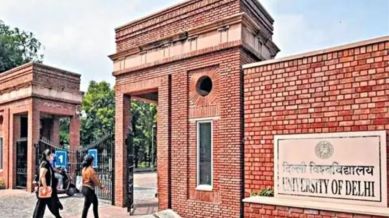Stay updated with the latest - Click here to follow us on Instagram
Nod at key DU meeting to course on ‘Sikh martyrdom’, credits through online platforms leads to objections
Another agenda item that was criticised was the formal adoption of a provision allowing undergraduate and postgraduate students to earn up to 40% of their credits through online platforms such as SWAYAM and MOOCs

A slew of curriculum changes were approved on Saturday at the Academic Council (AC) meeting of the University of Delhi amid a sharp dissent from a section of faculty over content control, outsourcing of credit hours, and the shifting locus of teaching authority.
Among the key decisions was the approval of a new general elective course titled “Sikh Martyrdom in Indian History (c.1500–1765)” to be offered by the Centre for Independence and Partition Studies (CIPS). The course aims to critically explore the development of Sikhism and the historical context of martyrdom under Mughal rule, covering key figures such as Guru Arjan Dev, Guru Tegh Bahadur, and Banda Singh Bahadur.
monthly limit of free stories.
with an Express account.
The nod, however, faced immediate criticism from some members of the council.
AC member and history professor Maya John called its academic positioning “highly objectionable.” “The offering of this course by the CIPS is itself concerning,” she said, objecting that it will be taught outside the History department.
John further flagged the absence of clarity on where and how the 60-hour course will be taught, given that students enrolled in various colleges will be selecting it as a generic elective.
Calling for scholarly rigour, John said: “I strongly recommend the inclusion of primary readings like the Zafarnama, Aurangzeb’s Will, the writings of Bhai Mani Singh, and works by scholars such as Yoginder Sikand, K.S. Duggal, G.S. Chabra, and Hardip Singh Syan.” She urged that the course be suitably modified and taught by trained historians.
Another agenda item that was criticised was the formal adoption of a provision allowing undergraduate and postgraduate students to earn up to 40% of their credits through online platforms such as SWAYAM and MOOCs. SWAYAM has been developed by the Indian government to provide free online courses.
While the move aligns with UGC guidelines and aims to offer flexibility and multidisciplinary access, it drew strong opposition from several faculty members.
“The award of 5% credits through Swayam and MOOCs will gravely jeopardise the integrity and academic standards of DU’s UG and PG programmes,” said John. “It will contribute to endemic flux in teaching workloads, diminish meaningful student-teacher engagement, and compromise classroom instruction,” John added.
Echoing these concerns, the Academic for Action and Development, Delhi Teachers’ Association, the university teacher body, said in a statement: “What’s more alarming is that institutions may allow up to 40% of the total courses in any semester to be offered online. Courses taught in classrooms for decades will now be shifted online. And with that shift, teachers will slowly be pushed out of the system, silenced by screens, replaced by portals.”
The Council also approved the implementation of the fourth year of UG programmes under the Undergraduate Curriculum Framework (UGCF) 2022. Students in their final year will now have the option to pursue one of three tracks — Dissertation, Academic Projects, or Entrepreneurship. Faculty members, regardless of whether they hold a PhD, will be eligible to supervise, provided they have relevant expertise. An Advisory Committee for Research (ACR) will oversee project allocations.
In a relief, the Council also passed a resolution allowing students admitted in the 2016–17 academic session an extension of two additional years to clear backlogs. This was done in view of course restructuring during the transition from CBCS to UGCF, which reportedly left several students behind schedule.
“Those who have fallen behind by one year in the final stage of CBCS will be able to avail this benefit,” the resolution noted.
DU’s Skill Enhancement Courses (SEC) also saw new additions. Students will now be able to take up radio jockeying as a course. The curriculum will include training in voice modulation, studio operation, scripting, anchoring, and music curation. Students will be given exposure to mock studio sessions and interactions with professionals.
Meanwhile, Vice Chancellor Yogesh Singh directed that pending bills related to paper checking be cleared urgently. “All departments should submit the bills soon and ensure payment without delay,” he instructed the Examination and Finance branches. A condolence resolution was also passed in memory of late Professor P C Joshi, former Pro-Vice Chancellor and Acting VC of DU.